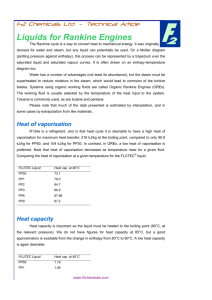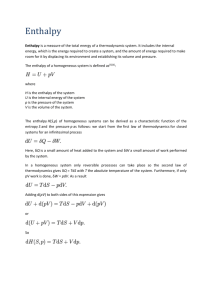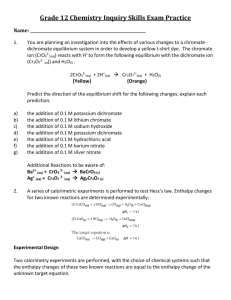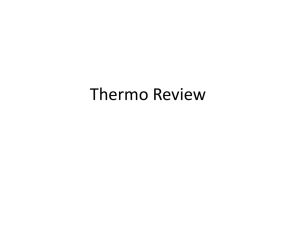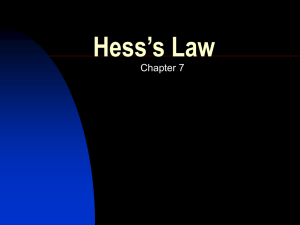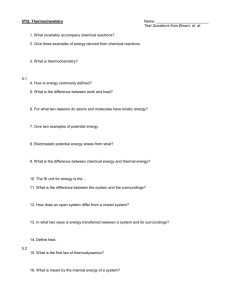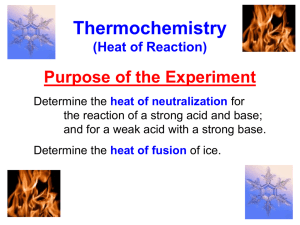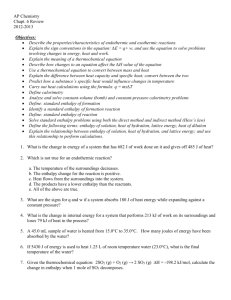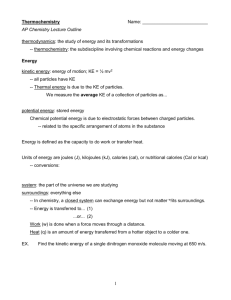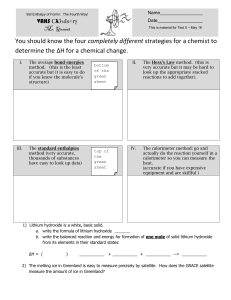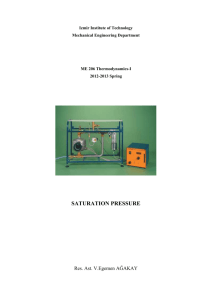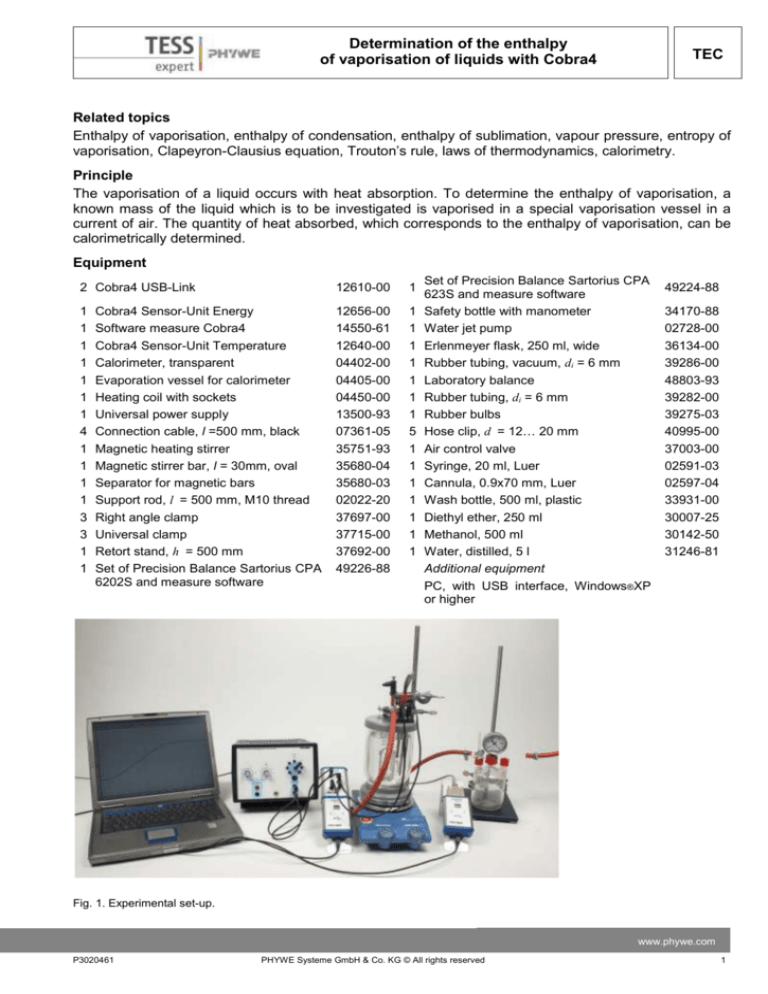
Determination of the enthalpy
of vaporisation of liquids with Cobra4
TEC
Related topics
Enthalpy of vaporisation, enthalpy of condensation, enthalpy of sublimation, vapour pressure, entropy of
vaporisation, Clapeyron-Clausius equation, Trouton’s rule, laws of thermodynamics, calorimetry.
Principle
The vaporisation of a liquid occurs with heat absorption. To determine the enthalpy of vaporisation, a
known mass of the liquid which is to be investigated is vaporised in a special vaporisation vessel in a
current of air. The quantity of heat absorbed, which corresponds to the enthalpy of vaporisation, can be
calorimetrically determined.
Equipment
2 Cobra4 USB-Link
12610-00
1
1
1
1
1
1
1
1
4
1
1
1
1
3
3
1
1
12656-00
14550-61
12640-00
04402-00
04405-00
04450-00
13500-93
07361-05
35751-93
35680-04
35680-03
02022-20
37697-00
37715-00
37692-00
49226-88
1
1
1
1
1
1
1
5
1
1
1
1
1
1
1
Cobra4 Sensor-Unit Energy
Software measure Cobra4
Cobra4 Sensor-Unit Temperature
Calorimeter, transparent
Evaporation vessel for calorimeter
Heating coil with sockets
Universal power supply
Connection cable, l =500 mm, black
Magnetic heating stirrer
Magnetic stirrer bar, l = 30mm, oval
Separator for magnetic bars
Support rod, l = 500 mm, M10 thread
Right angle clamp
Universal clamp
Retort stand, h = 500 mm
Set of Precision Balance Sartorius CPA
6202S and measure software
Set of Precision Balance Sartorius CPA
623S and measure software
Safety bottle with manometer
Water jet pump
Erlenmeyer flask, 250 ml, wide
Rubber tubing, vacuum, di = 6 mm
Laboratory balance
Rubber tubing, di = 6 mm
Rubber bulbs
Hose clip, d = 12… 20 mm
Air control valve
Syringe, 20 ml, Luer
Cannula, 0.9x70 mm, Luer
Wash bottle, 500 ml, plastic
Diethyl ether, 250 ml
Methanol, 500 ml
Water, distilled, 5 l
Additional equipment
PC, with USB interface, Windows®XP
or higher
49224-88
34170-88
02728-00
36134-00
39286-00
48803-93
39282-00
39275-03
40995-00
37003-00
02591-03
02597-04
33931-00
30007-25
30142-50
31246-81
Fig. 1. Experimental set-up.
www.phywe.com
P3020461
PHYWE Systeme GmbH & Co. KG © All rights reserved
1
TEC
Determination of the enthalpy
of vaporisation of liquids with Cobra4
Safety instructions
When handling chemicals, you should wear suitable protective gloves, safety goggles, and suitable
clothing. Please refer to the appendix for detailed safety instructions.
Tasks
1. Determine the molar enthalpy of vaporisation of diethyl ether and methanol.
2.
Calculate the molar entropies of vaporisation and discuss the results under consideration of Trouton’s rule.
Set-up and procedure
-
Set up the experiment as shown in Fig.1.
-
Combine the Cobra4 Sensor-Unit Energy and the temperature probe with the Cobra4 USB-Links.
-
Connect the power supply with the Cobra4 Sensor-Unit Energy but leave the heating coil unconnected.
-
Start the PC and connect each Cobra4 USB-Link with a USB socket of the computer.
-
Call up the ‘measure’ programme in Windows, some ID numbers (01 and 02) are allocated to the
sensors, which are indicated in the displays of the Cobra4 USB-Links.
-
Place the clean and dry evaporation vessel in an Erlenmeyer flask and fill it through the straight inlet tube with 15 ml of the liquid to be evaporated using a syringe with a cannula.
-
Following this, attach a 5 cm length of rubber tubing to the air inlet tube and connect it to the air
control valve.
-
Only then, close off the right-angled air outlet tube with a rubber cap to prevent loss of substance
due to vaporisation.
-
Subsequent to this, determine the mass of the evaporation vessel, which has been thus prepared
(weighing accuracy: 0.0001 g). The Erlenmeyer flask serves merely as a support for the evaporation vessel.
-
Fill the calorimeter with 900 g of distilled water which is at room temperature (weighing accuracy =
0.1 g).
-
Put the oval magnetic stirrer bar into the calorimeter and switch the magnetic stirrer on (Caution:
Do not mistakenly switch on the heating unit!).
-
Insert the heating coil, the temperature probe and the evaporation vessel into the lid of the calorimeter and fix them in position.
-
Take off the rubber cap and connect the evaporation vessel to the filter pump via the safety bottle.
-
Wait until a temperature equilibrium has been reached (approximately 10 min). Start the measurement with a click on in the icon strip.
-
Ensure that the equilibrium temperature has been reached in the calorimeter, i.e. the temperature
2
PHYWE Systeme GmbH & Co. KG © All rights reserved
P3020461
Determination of the enthalpy
of vaporisation of liquids with Cobra4
TEC
remains constant or shows only a slight drift, then turn on the water jet pump and start the vaporisation process by carefully opening the air control valve on the air inlet. Avoid vigorous sputtering
and delayed boiling.
-
When the temperature of the water has decreased by approx. 1°C, close the air control valve and
shut off the water jet pump (let air into the safety bottle!). Immediately remove the vacuum tubing
from the air outlet tube of the evaporation vessel and close this outlet tube with the rubber cap.
Continue to measure and record the temperature of the system until a new equilibrium has been
reached or until the alteration only occurs slowly and linearly.
-
Now, perform electrical calibration to determine the total heat capacity of the calorimeter. To do
this, supply 10 V AC to the Cobra4 Sensor-Unit Energy for the electric heating and then put the
free ends of the heating coil connection cables into the output jacks. The system is now continuously heated and the supplied quantity of energy is measured. When approximately 4000 Ws were
transferred switch off the heating by pulling the connection cables out of the heating coil. Continue
to measure for another three minutes, then stop temperature recording with a click on in the icon
strip.
Fig. 2 shows the graph as it is presented by the programme when the measurement is stopped. If you
use <survey> from the toolbar you can read the temperature difference data. Subsequently remove the
closed evaporation vessel, carefully dry it, then weigh it in the Erlenmeyer flask which was previously
used. From the two weighings, i.e. before and after vaporisation, the quantity of vaporised substance can
be calculated. Always thoroughly clean and dry the evaporation vessel before performing a new measurement.
Fig. 2: Temperature- time curve of the vaporisation of diethyl ether and for determining the heat capacity of the system.
www.phywe.com
P3020461
PHYWE Systeme GmbH & Co. KG © All rights reserved
3
Determination of the enthalpy
of vaporisation of liquids with Cobra4
TEC
Theory and evaluation
When liquids are heated at constant pressure, a certain temperature is reached at which the substance
is converted from the liquid to the vapour phase. This boiling point remains constant under further addition of heat until the liquid phase has been completely vaporised. If a mole of liquid is vaporised, its molar enthalpy H increases by the amount of heat absorbed QV. This difference in enthalpies is termed the
enthalpy of vaporisation ∆VH and is explained by the energy required to break the bonds between the
molecules in the liquid and the constantly changing pressure that the vapour formed must exert against
the existing external pressure. If the vapour is cooled, condensation occurs at the same temperature –
the process is reversible. Consequently, the increase in entropy ∆VS which accompanies the vaporisation can be formulated by applying the second principle of thermodynamics:
𝚫𝐕 𝑺 =
𝚫𝐕 𝐇
𝑻𝐕
(1)
In many liquids the molar entropy of vaporisation lies in the range between 80 and 90 J · mol-1 · K-1. This
rule was named after Trouton and is especially valid for non-associated liquids. Strong interactions between the molecules of liquid, such as hydrogen bonds, result in higher entropies of vaporisation.
In the present experiment, the liquid is vaporised in an airstream below the boiling point of the liquid. In
doing so, the equilibrium between the liquid and the vapour phase is disturbed by the continuous removal of the vapour phase. The enthalpy of vaporisation is equal to the amount of heat which is withdrawn
from the calorimeter.
𝚫𝐕 𝑯 = 𝚫𝐕 𝑺 ∙ 𝑻𝐕
(1.1)
𝚫𝐕 𝒉
𝒏
(2)
𝚫𝐕 𝑺 = −𝑪𝐊 ∙ 𝚫𝑻𝐕
(3)
𝑾𝒆𝒍 = 𝑪𝑲 ∙ ∆𝑻𝒆𝒍
(4)
𝚫𝐕 𝑯 =
𝑪𝑲 =
𝑾𝒆𝒍
𝑻𝒆𝒍
(4.1)
𝑴
∆𝑽 𝑯 = −𝑪𝑲 ∙ ∆𝑻𝑽 ∙ 𝒎
∆𝑻
𝑴
∆𝑽 𝑯 = −𝑾𝒆𝒍 ∙ ∆𝑻 𝑽 ∙ 𝒎
𝒆𝒍
4
(5)
(5.1)
PHYWE Systeme GmbH & Co. KG © All rights reserved
P3020461
Determination of the enthalpy
of vaporisation of liquids with Cobra4
TEC
∆TV Temperature difference during vaporisation
Tel Temperature difference during calibration
Wel Electrical work
CK Heat capacity of the calorimeter
n Quantity of vaporised substance (m/M)
Data and results
Molar mass of methanol:
Molar mass of diethyl ether:
Boiling point of methanol:
Boiling point of diethyl ether:
Enthalpy of vaporisation of methanol:
Enthalpy of vaporisation of diethyl ether:
Entropy of vaporisation of methanol:
Entropy of vaporisation of diethyl ether:
32.04 g · mol-1
74.12 g · mol-1
337.7 K
307.7 K
33.8 kJ · mol-1
25.6 kJ · mol-1
100.0 J · mol-1 · K-1
83.2 J · mol-1 · K-1
Appendix
Hazard symbol, signal word
Hazard statements
Precautionary statements
Diethyl ether
H224: Extremely flammable liquid and vapour
H302: Harmful if swallowed
H336: May cause drowsiness
or dizziness
Danger
P210: Keep away from
heat/sparks/open flames/hot surfaces – No smoking
P304+340: If inhaled: Remove victim to fresh air and keep at rest in a
position comfortable for breathing
P403+235: Store in a well ventilated
place. Keep cool
Methanol
Danger
P210: Keep away from
heat/sparks/open flames/hot surfaces – No smoking
H225: Highly flammable liquid
P233: Keep container tightly closed
and vapour
P280: Wear protective
H301 + H311 + H331:
gloves/protective clothing/eye proToxic if swallowed, in contact
tection/face protection
with skin or if inhaled
P302+352: IF ON SKIN: Wash with
H370: Causes damage to orsoap and water
gans (or state all organs affect- P304+340: IF INHALED: Remove
ed, if known) (state route of ex- victim to fresh air and keep at rest in
posure if it is conclusively prov- a position comfortable for breathing
en that no other routes of expo- P309+P310: IF exposed or you feel
sure cause the hazard)
unwell: Immediately call a POISON
CENTER or doctor/physician
P403+235: Store in a well ventilated
place. Keep cool
www.phywe.com
P3020461
PHYWE Systeme GmbH & Co. KG © All rights reserved
5
TEC
Determination of the enthalpy
of vaporisation of liquids with Cobra4
Room for notes:
6
PHYWE Systeme GmbH & Co. KG © All rights reserved
P3020461

